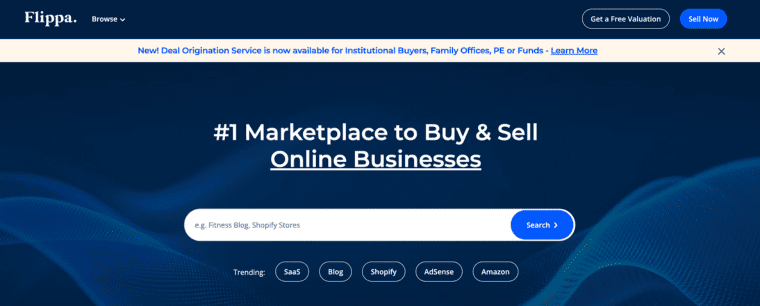This page may contain affiliate links. Please read my disclosure for more information.
More than ever before, people are looking to start an online store, start a blog, sell on Amazon and buy established websites that can generate revenue and provide small business owners with a solid online presence. Whether it’s an e-commerce site, a content-based blog, or a niche-specific platform, there is a demand for websites across various industries.
If you’ve ever wondered how to sell websites and get the maximum profit, this post is for you.
Having a good grasp of the concepts of selling a website can help you make informed decisions and position your website for maximum profit. By being aware of market trends, buyer preferences, and pricing dynamics, you can strategically navigate the process of selling your website and achieve a successful sale.
When you sell a website, your goal should be to secure the highest possible profit. Why? Well, not only does it provide you with a healthy return on your investment, but it also sets you up for future endeavors. The funds you generate from the sale can be used to fuel new business ventures, invest in other assets, or simply give you a well-deserved financial boost.
But maximizing your website’s flipping profit doesn’t happen by chance. It requires a strategic approach and a well-thought-out plan. And that’s where the 7 steps to sell your website for the most money come into play.

Step 1: Evaluate and optimize your website
Before you put your website up for sale, take the time to evaluate its performance. Identify areas for improvement, optimize its design, and enhance the user experience. A well-optimized website is not only more attractive to potential buyers but also commands a higher price.
Step 2: Gather accurate data and documentation
Buyers want to see the numbers and facts. Gather accurate data about your website’s traffic, revenue, and other relevant metrics. Additionally, compile all the necessary documentation, such as financial records, customer data, and legal agreements. Transparency and thorough documentation instill confidence in potential buyers.
Step 3: Set a realistic asking price
Determining the right asking price is crucial. Conduct market research, consider industry benchmarks, and assess the value of similar websites sold recently. Setting a realistic asking price ensures that you attract potential buyers while still maximizing your net profit amount.
Step 4: Prepare a comprehensive sales package
Create a sales package that showcases the strengths and potential of your website. Include detailed descriptions, financial and traffic data, growth opportunities, and any unique selling points.
Visuals like screenshots and videos can also add that extra oomph to make your website stand out.
Step 5: Market your website effectively
Now it’s time to spread the word! Develop a targeted marketing strategy to reach potential buyers. Utilize online platforms, social media, industry networks, and other channels to generate interest. Engage with potential buyers, respond promptly to inquiries, and provide additional information as needed.
Step 6: Negotiate and structure the deal
As the offers start rolling in, carefully evaluate each proposal. Negotiate to get the best possible deal. Consider not only the purchase price but also payment terms, contingencies, and any ongoing involvement you may have with the website post-sale. Consult professionals to ensure the terms protect your interests.
Step 7: Secure a smooth transition
Once the deal is sealed, it’s time to ensure a seamless handover to the new business owner. Assist with the website migration, transfer domain and hosting accounts, and provide any necessary support. Maintaining open communication during the transition fosters a positive experience for both parties.

How much can you sell a website for?
You’re probably wondering how much you can sell your website for. Well, determining the value of a website involves considering several factors.
Here are some key factors that play a role in determining a website’s value:
When assessing the value of a website, potential buyers will consider factors like:
- Revenue
The amount of money the website generates, including income from ads, products, or services.
- Traffic
The number of visitors the website attracts, as higher traffic generally indicates a larger potential audience.
- Niche and Market Potential
The popularity and growth prospects of the website’s niche or industry.
- Content Quality
The uniqueness, relevance, and overall quality of the website’s content.
- Monetization Strategies
The effectiveness and diversity of revenue streams implemented on the website.
- Branding and Reputation
The strength of the website’s brand and its reputation within the industry or target audience.
Methods for estimating the value of a website
There are several approaches to estimating a website’s value, and here are three commonly used methods:
- Revenue-based valuation
This method focuses on the website’s revenue generation. Buyers may evaluate the website’s financial records, profit margins, and revenue consistency to determine its value. They often consider factors like revenue trends, growth potential, and the stability of income streams.
- Traffic-based valuation
In this approach, the website’s traffic metrics, such as unique visitors, page views, and engagement metrics, are key indicators of value. Higher traffic usually translates to a larger potential audience, making the website more attractive to buyers. Additionally, factors like organic traffic sources, user demographics, and user retention may also impact the website valuation.
- Asset-based valuation
This method involves assessing the website’s tangible and intangible assets. Tangible assets include physical inventory, equipment, or intellectual property rights. Intangible assets can include the website’s domain name, branding, trademarks, copyrights, and its existing user base or email list. Buyers often consider the potential value of these assets when determining the overall value of the website.
Remember, the valuation of a website is not an exact science, and different buyers may have varying perspectives on its worth. That’s why it’s important to present accurate and compelling data during the selling process to justify your asking price and demonstrate the potential value of your website.
How does selling websites work?

If you’re ready to sell your website but not exactly sure how the process works, keep reading. I’ll break it down and give you a clear understanding of what to expect.
First, let’s talk about the key players involved in the website selling process:
Brokers and marketplaces
These are intermediaries who connect buyers and sellers when selling a website. Brokers and marketplaces specialize in facilitating website sales, helping sellers find potential buyers and guiding them through the entire process.
They often have a network of qualified buyers and provide valuable services like valuation, listing creation, and negotiation support. Working with a broker or utilizing a reputable marketplace like Flippa or Empire Flippers can save you time and effort in finding the right buyer for your website.

Buyers and sellers
As the name suggests, buyers are individuals or companies interested in purchasing websites. They may be entrepreneurs looking for an established online business or investors seeking profitable digital assets.
On the other side, sellers like you are the website owners looking to monetize their own online businesses or venture and transfer ownership to a new owner. It’s important to find the right buyer who aligns with your goals and values your website.
Now, let’s consider the legal and financial aspects you need to keep in mind when selling a website:
Contracts and agreements
Selling a website involves legal considerations, so it’s essential to have proper contracts and agreements in place. These documents protect both the buyer and the seller and outline the terms of the sale, including the purchase price, payment schedule, asset transfer, non-compete clauses, and any warranties or representations.
It’s advisable to work with a lawyer experienced in website sales to ensure the contracts are comprehensive and tailored to your specific situation.
Additionally, consider any legal obligations related to intellectual property rights, privacy policies, user data, or content licenses associated with the website. Addressing these aspects upfront and ensuring compliance can mitigate risks and provide a smooth transition for you and the buyer.
Tax implications
Taxes can’t be ignored when it comes to selling your website. Just like any other financial transaction, selling a website can have tax implications. It’s important to be aware of these implications to avoid any surprises down the road.
When you sell a website, the tax treatment will depend on different factors such as your jurisdiction, the type of entity you operate under (individual, partnership, corporation, etc.), and the specific circumstances of the sale.
Here are a few tax considerations to keep in mind:
Capital Gains Tax
In many countries, the sale of a website may be subject to capital gains tax. This tax is typically applied to the profit you make from selling a capital asset—your website, in this case. The rate at which capital gains tax is applied can vary, so it’s crucial to consult with a tax professional or accountant who can guide you through the specific tax laws and regulations in your jurisdiction.
Depreciation Recapture
If you have claimed depreciation expenses on your website, there may be a portion of the sale proceeds that could be subject to depreciation recapture. This means that the tax authorities may “recapture” a portion of the tax benefits you previously received from depreciating the asset.
Qualified Small Business Exemption
Depending on your jurisdiction, there might be certain exemptions or deductions available to small businesses or qualified entrepreneurs. These exemptions can potentially reduce the tax burden on the sale of your website. Research the applicable rules and consult with a tax professional to explore any potential benefits you may qualify for.
Remember, tax laws and regulations can be complex and subject to change, so it’s always wise to seek professional advice from an accountant or tax expert who specializes in digital asset sales. They can help you navigate the tax landscape, ensure compliance, and optimize your tax strategy.
Is it profitable to sell websites?

Is it profitable to sell websites? Well, the answer is yes in can be. Selling websites can indeed be profitable for many reasons.
Advantages of selling a website for profit:
1. Return on Investment
If you’ve invested time, money, and effort into building and growing your website, selling it can yield a significant return on your initial investment. It allows you to monetize the value you’ve created and potentially generate a substantial profit.
2. Capital for New Ventures
The funds you receive from selling your website can provide a financial foundation for your next venture. Whether it’s starting a new online business, investing in other assets, or pursuing different opportunities, the profit from selling your website can give you the capital you need to kick-start your next endeavor.
Potential challenges and risks to consider:
1. Emotional Attachment
Selling a website you’ve poured your heart and soul into can be emotionally challenging. It’s essential to approach the sale with a clear mindset and understand that it’s a business transaction. Don’t let sentimental attachments cloud your judgment when it comes to pricing and negotiation.
2. Market Volatility
Selling a website can be influenced by external factors, including economic conditions, industry trends, and buyer demand. Fluctuations in the market can impact the price and speed of the sale. It’s important to be flexible, adaptable, and keep an eye on the market to maximize your profit potential.
By understanding the advantages and challenges associated with selling your website, you can make informed decisions and set realistic expectations. With the right approach, proper planning, and strategic execution, selling your website can be a profitable venture.
How long does it take to sell a website?

Let’s talk about the timeline for selling a website. Selling a website is not an instant process—it takes time, effort, and strategic planning. The actual timeframe can vary depending on various factors, so let’s take a look at what influences the timeline:
Factors that impact the timeline for selling a website:
1. Website’s Marketability
The more marketable your website is, the higher the demand from potential buyers, which can lead to a faster sale. Factors like revenue growth, niche market potential, and a solid user base can make your website more attractive and speed up the selling process.
2. Market Conditions
The state of the market can influence the timeline. During periods of high demand and increased buyer activity, you might experience a faster sale. Conversely, if the market is slow or there is less demand, it may take longer to find the right buyer.
3. Pricing and Negotiation
The negotiation process can impact the timeline as well. Finding the right price and negotiating the terms of the sale can sometimes take time. It’s important to strike a balance between maximizing your profit and meeting the buyer’s expectations.
Average timeframes for selling your website in different scenarios:
While there is no one-size-fits-all answer to how long it takes to sell a website, it’s helpful to have a general idea of average timeframes. In some cases, websites can sell within a few weeks, while others may take several months to find the right buyer. It’s important to be patient and persistent during the process.
Factors such as the website’s niche, size, revenue, and the availability of potential buyers in the market can influence the duration. By working with reputable brokers or marketplaces, leveraging effective marketing strategies, and pricing your website competitively, you can increase your chances of achieving a faster sale.
Each website sale is unique, and the timeline can vary based on multiple factors. The key is to stay proactive, stay open to negotiations, and maintain a realistic mindset throughout the process.

Strategies for expediting the selling process
Now, let’s talk about some effective strategies that can help expedite the selling process and increase the chances of a quick sale. Time is of the essence, so let’s dive right in!
1. Pricing Competitively
We mentioned this before, but it’s worth emphasizing again. Pricing your website competitively is key to attracting potential buyers and expediting the sale. Conduct thorough market research, analyze comparable website sales, and seek professional advice to determine the optimal price range for your website.
Pricing it too high may deter buyers while pricing it too low might undervalue your hard work.
2. Showcase the Value
Highlight the unique value propositions of your website in your marketing materials and communications. Showcase the revenue potential, growth opportunities, and any distinct features that set your website apart from the competition.
By clearly communicating the value that buyers will receive, you create a sense of urgency and increase the likelihood of a quick sale.
3. Leverage Existing Networks
Tap into your existing network of contacts and industry connections. Spread the word about your website sale to individuals or businesses who may be interested buyers or know potential buyers.
Networking can often lead to faster sales as you reach an audience that is already familiar with your industry and may have a genuine interest in your website.
4. Efficient Listing Creation
Craft a compelling and informative listing description that captures the essence of your website. Highlight its strengths, revenue streams, traffic statistics, and growth potential. Use high-quality visuals, such as screenshots and videos, to provide a visual representation of your website’s value.
The more detailed and engaging your listing is, the more likely it will attract serious buyers and speed up the sale.

Preparing Your Website for Sale
Now that we’ve discussed strategies for expediting the selling process, let’s move on to the crucial step of preparing your website for sale. A well-prepared website not only enhances its marketability but also increases its perceived value. Here’s how you can do it:
A. Conducting a comprehensive website audit
Evaluate your website from top to bottom. Identify any areas that need improvement, such as outdated content, broken links, or slow loading times. Fixing these issues ensures that your website presents itself in the best possible light to potential buyers.
B. Enhancing the design and user experience
A visually appealing and user-friendly website is more likely to attract buyers. Consider updating the website’s design to make it modern and visually appealing. Optimize the user experience by improving navigation, streamlining the checkout process (if applicable), and ensuring mobile responsiveness.
C. Addressing technical issues and optimizing performance
Technical issues can be a major turn-off for potential buyers. Check for any broken functionality, fix bugs, and optimize the website’s performance and loading speed. Ensure that the website runs smoothly across different browsers and mobile devices.
By conducting a comprehensive website audit, enhancing the design and user experience, and addressing technical issues, you significantly increase the chances of a quick and successful sale.
Buyers are more likely to be attracted to a well-maintained and optimized website that offers a seamless experience.

Choosing the Right Platform or Broker to Sell Websites
When it comes to selling your website, selecting the right platform or working with a reputable website broker can make a world of difference. Here are some key factors to consider:
1. Researching and selecting a reputable website marketplace
Look for established website marketplaces that have a track record of successful transactions. Read reviews, consider their user base and reach, and assess their credibility within the website-selling community.
A reputable marketplace can provide you with a wider pool of potential buyers and a platform to showcase your website effectively.
2. Evaluating the benefits of using a broker
Brokers can offer valuable expertise, connections, and guidance throughout the selling process. They can help you with valuation, negotiation, and ensure a smooth transaction.
Consider the services they provide, their experience in the website selling and e-commerce store industry, and their success rate in achieving favorable deals for sellers.
3. Comparing different platforms and their fee structures
Evaluate the fee structures of different platforms or brokers. Some charge a percentage of the sale price, while others have fixed fees or subscription business models. Consider the value you’ll receive in return for the fees charged and weigh it against your specific needs and budget.
By conducting your due diligence, thorough research and selecting the right platform or broker, you can enhance your chances of reaching potential buyers efficiently and securing a successful sale.

Understanding the services provided by brokers or marketplaces
When it comes to selling your website, brokers and marketplaces can offer valuable services to facilitate the process and maximize your chances of a successful sale.
Let’s dive into what these professionals can bring to the table:
1. Valuation
Brokers and marketplaces often provide valuation services to help you determine the fair market value of your website. They assess various factors such as revenue, traffic, niche competitiveness, and growth potential to arrive at an accurate valuation.
This expertise ensures that you set a realistic asking price and maximize your profit potential.
2. Listing Creation
Brokers can assist in creating compelling listings that effectively showcase the value of your website. They know how to craft engaging descriptions, utilize persuasive language, and highlight the unique selling points that make your website stand out from the competition.
A well-crafted listing captures the attention of potential buyers and encourages them to explore further.
3. Marketing and Promotion
Brokers and marketplaces have established networks and access to potential buyers actively seeking websites. They can leverage their resources and connections to market your website effectively.
Through their platforms, they can promote your listing to a targeted audience, increasing its visibility and attracting potential buyers who are genuinely interested in acquiring websites like yours.
4. Buyer Screening
These professionals often screen potential buyers, get NDAs signed (if necessary) to ensure they are serious and financially qualified. This saves you time and effort by filtering out individuals who may not have the intention or means to complete the transaction.
The screening process helps identify genuine prospects who are more likely to proceed with the purchase.
Now that you have an understanding of the services provided by brokers and marketplaces, let’s shift our focus to marketing and promoting your website.

Marketing and Promoting Your Website
To increase the visibility of your website and attract potential buyers, effective marketing and promotion are essential. Here are some key strategies to consider:
1. Crafting a compelling listing description
Your listing description serves as your website’s sales pitch. It should be concise, engaging, and highlight the unique features and benefits that set your website apart.
Clearly communicate the revenue potential, growth opportunities, and any special attributes that make your website an attractive investment.
2. Highlighting the unique selling points of your website
Identify the distinctive aspects of your website that differentiate it from others in the market. This could be a loyal user base, innovative features, proprietary technology, or a strong brand presence.
Emphasize these unique selling points in your marketing materials to capture the attention of potential buyers.
3. Utilizing social media and online advertising for promotion
Leverage social media platforms and online advertising channels to reach a broader audience. Create targeted ad campaigns to showcase your website to individuals who are likely to be interested in acquiring similar websites.
Engage with potential buyers through social media platforms by sharing valuable content, responding to inquiries, and creating a buzz around your website sale.
Effective marketing and promotion require a strategic approach. Tailor your messaging to resonate with your target audience, utilize visual elements to captivate attention, and engage with potential buyers to build relationships and establish trust.
In the following sections, we’ll continue our comprehensive guide to selling websites. We’ll explore more aspects of the process, share expert insights, and equip you with practical tips to maximize your profit potential. So, let’s keep moving forward on our path to a successful website sale!

Engaging with potential buyers and responding to inquiries
As potential buyers start showing interest in your website, it’s crucial to engage with them effectively and provide timely responses to inquiries. This step is vital in building rapport, establishing trust, and ultimately closing a successful sale.
Negotiating the Sale
Negotiation is a crucial phase in the selling process, where both parties strive to reach a mutually beneficial agreement. Here are some key aspects to consider when negotiating the sale of your website:
Understanding the art of negotiation
Negotiation involves finding common ground and reaching an agreement that satisfies both the buyer and the seller. It requires effective communication, active listening, and a willingness to understand the other party’s perspective.
Approach negotiations with a collaborative mindset, aiming for a win-win outcome.
Strategies for maximizing the selling price
Use strategic negotiation tactics to maximize the selling price of your website. Consider the following strategies:
- Know your value: Understand the unique value and potential of your website and leverage that knowledge during negotiations.
- Highlight growth opportunities: Emphasize the growth prospects and monetization possibilities to justify a higher selling price.
- Bundle additional assets: If you have additional assets related to your website, such as a mailing list or proprietary software, consider including them in the negotiation to increase the perceived value.
Remember, negotiation is a give-and-take process. Be open to compromise and be prepared to negotiate on various aspects of the deal.

Ensuring a Smooth Website Transfer
Once you’ve reached an agreement and finalized the sale, it’s time to ensure a smooth transfer of the website to the buyer. Here are some essential steps to facilitate the transfer process:
A. Transferring domain and hosting accounts
Coordinate with the buyer to transfer the domain name and hosting accounts associated with your website. Provide them with the necessary login credentials or assist them in the transfer process. Ensure a seamless transition to the buyer’s ownership of these crucial assets.
B. Exporting and transferring website files and databases
Gather all website files, including HTML, CSS, images, and other media elements. Export the website’s databases, if applicable, and provide the buyer with the necessary files and instructions for importing them to their hosting environment.
This ensures the buyer has all the components needed to maintain and operate the website effectively.
C. Assisting the buyer with website migration and setup
Offer support and guidance to the buyer during the website migration and setup process. This can include providing documentation, answering questions, and offering assistance in troubleshooting any technical issues that may arise during the transfer.
By being available and helpful, you contribute to a smoother transition for the buyer.
D. Providing post-sale support and guidance
Congratulations! You’ve successfully sold your website. But the journey doesn’t end there. Providing post-sale support and guidance is crucial to ensure a smooth transition for the buyer and maintain a positive reputation. Here are some important aspects to consider:
1. Transition Assistance
Offer support to the buyer during the initial transition period. This can include providing documentation, conducting training sessions, and offering guidance on operating and managing the website.
By sharing your expertise and providing post-sale support, you help the buyer feel confident and equipped to take over the reins.
2. Knowledge Transfer
Share any relevant information or insights that will help the buyer effectively manage the website. This can include marketing strategies, customer insights, growth opportunities, or any other valuable knowledge you’ve acquired during your ownership.
Your willingness to share insights contributes to a successful transition and sets a positive tone for future interactions.
3. Ongoing Communication
Stay in touch with the buyer and maintain open lines of communication even after the sale. Offer your assistance and address any questions or concerns that may arise.
Demonstrating your commitment to the buyer’s success and offering ongoing support can strengthen the buyer-seller relationship and foster positive referrals or testimonials from private buyers.
Remember, providing post-sale support is not only beneficial for the buyer but also for your own reputation as a trustworthy seller. Positive word-of-mouth can lead to future opportunities and referrals within the industry.

Conclusion
Selling websites for maximum profit requires careful planning, strategic execution, and a comprehensive understanding of the process.
By following the 7 steps outlined in this guide, you can position your website for success and secure the highest possible profit.
Determining the value of your website, understanding the selling process, addressing legal and financial considerations, and implementing effective marketing strategies are key to achieving a successful sale.
Remember to stay informed, adapt to market trends, and seek professional advice when needed.







+ show Comments
- Hide Comments
add a comment